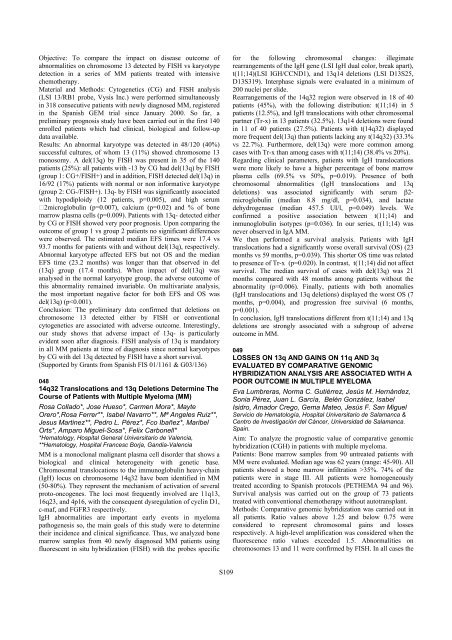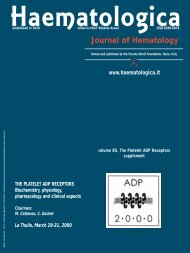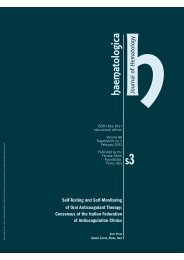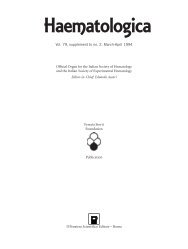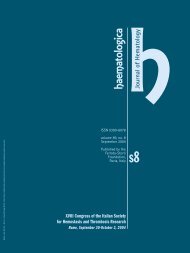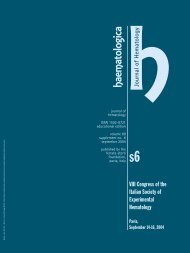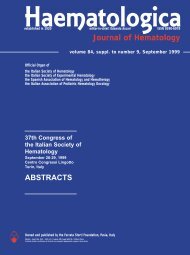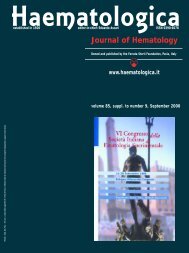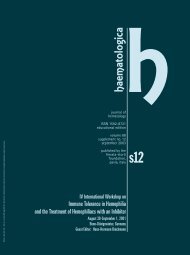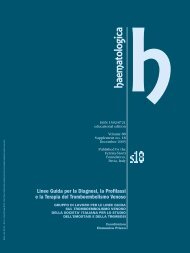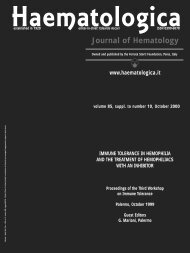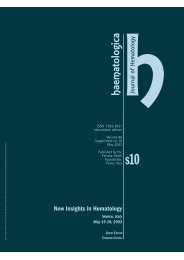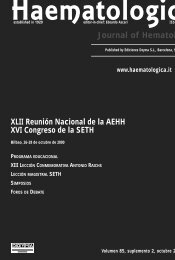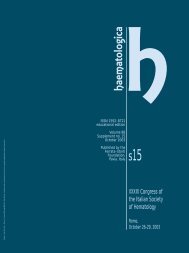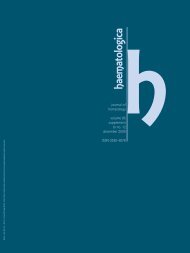Haematologica 2003 - Supplements
Haematologica 2003 - Supplements
Haematologica 2003 - Supplements
Create successful ePaper yourself
Turn your PDF publications into a flip-book with our unique Google optimized e-Paper software.
Objective: To compare the impact on disease outcome of<br />
abnormalities on chromosome 13 detected by FISH vs karyotype<br />
detection in a series of MM patients treated with intensive<br />
chemotherapy.<br />
Material and Methods: Cytogenetics (CG) and FISH analysis<br />
(LSI 13/RB1 probe, Vysis Inc.) were performed simultaneously<br />
in 318 consecutive patients with newly diagnosed MM, registered<br />
in the Spanish GEM trial since January 2000. So far, a<br />
preliminary prognosis study have been carried out in the first 140<br />
enrolled patients which had clinical, biological and follow-up<br />
data available.<br />
Results: An abnormal karyotype was detected in 48/120 (40%)<br />
successful cultures, of whom 13 (11%) showed chromosome 13<br />
monosomy. A del(13q) by FISH was present in 35 of the 140<br />
patients (25%): all patients with -13 by CG had del(13q) by FISH<br />
(group 1: CG+/FISH+) and in addition, FISH detected del(13q) in<br />
16/92 (17%) patients with normal or non informative karyotype<br />
(group 2: CG-/FISH+). 13q- by FISH was significantly associated<br />
with hypodiploidy (12 patients, p=0.005), and high serum<br />
2microglobulin (p=0.007), calcium (p=0.02) and % of bone<br />
marrow plasma cells (p=0.009). Patients with 13q- detected either<br />
by CG or FISH showed very poor prognosis. Upon comparing the<br />
outcome of group 1 vs group 2 patients no significant differences<br />
were observed. The estimated median EFS times were 17.4 vs<br />
93.7 months for patients with and without del(13q), respectively.<br />
Abnormal karyotype affected EFS but not OS and the median<br />
EFS time (23.2 months) was longer than that observed in del<br />
(13q) group (17.4 months). When impact of del(13q) was<br />
analysed in the normal karyotype group, the adverse outcome of<br />
this abnormality remained invariable. On multivariate analysis,<br />
the most important negative factor for both EFS and OS was<br />
del(13q) (p35%. 74% of the<br />
patients were in stage III. All patients were homogeneously<br />
treated according to Spanish protocols (PETHEMA 94 and 96).<br />
Survival analysis was carried out on the group of 73 patients<br />
treated with conventional chemotherapy without autotransplant.<br />
Methods: Comparative genomic hybridization was carried out in<br />
all patients. Ratio values above 1.25 and below 0.75 were<br />
considered to represent chromosomal gains and losses<br />
respectively. A high-level amplification was considered when the<br />
fluorescence ratio values exceeded 1.5. Abnormalities on<br />
chromosomes 13 and 11 were confirmed by FISH. In all cases the<br />
S109


